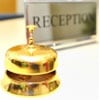A: Aparthotel - The abbreviation for apartment hotel (also referred to as serviced apartments or extended stay). This growing type of business model within the sector uses a hotel-style booking model to hire out bedrooms which may contain basic self-catering facilities and lounge areas. The main benefit for guests is more flexibility over the amount of time they can stay (stays can be from one night to three months) and lower costs, while operators don't have the same staff costs or overheads as full-serviced hotels.

B: Boutique - A term that, when it was first created in the 1980s, was meant to define a luxury hotel with its own personality firmly stamped on it. Typically a boutique hotel (also referred to as lifestyle hotel) would be under 200 rooms, feature uber-stylish and uniquely-styled rooms with small touches applied to the decor and service to make it memorable to the guest. However, just like the pub sector's 'gastropub' term has been taken out of its niche zone and adopted by the big chains, the same has arguably happened in the case of the boutique hotel with some of the larger hotel chains launching new smaller 'boutique' style brands which are squarely aimed at taking market share from the independents.
C: Concierge - A French word whose rough translation is ‘caretaker’ but in the luxury hotel sector the concierge is so much more than someone who keeps an eye on things. For anyone wanting to be a concierge, they need to be friendly and able to fulfill any request for a guest, even, as in the case of veteran concierge Hugo de Castro of the Grand Jersey Hotel & Spa, they may be fairly bizarre ones. As technology improves and integrates more into our lives, some hotels, such as Hilton are turning to a virtual concierge service for guests, but it may be some time before an app can be developed to keep a guest's fish alive.

D: Debt - It is rare for any company to operate without having any debts, but the hotel sector relies heavily on borrowing to operate. As the economic downturn has taken its toll and the banks start to ask for their money back, the hotel groups with large debts have been forced to re-finance in a variety of ways to reduce them. Recent examples include Malmaison's debt repayments through sale and leasebacks of its hotels in 2011 and Travelodge's £635m debt restructure deal last year.
E: Empty 2013 - Following a 2012 packed full of once-in-a-lifetime events such as the London Olympics and the Queen's Diamond Jubilee, many have labelled this year as 'Empty 2013' - warning of difficult trading conditions ahead as the focus moves away from Britain. But the majority of hotel operators do remain optimistic, insisting that the next 12 months could be even more successful than the last.

F: Franchising - The franchise model in the hotel sector can be a safer bet for the operator who wants all the benefits that come with being part of a big brand (marketing etc), but that allows them to operate it in a way in which they can maximise profits for themselves. Alongside the existing, largely American-based hotel companies who offer franchises, there are now smaller, UK-based companies such as Umi hotels, who are actively seeking to expand their businesses in this way.
G: Global Distribution System (or GDS) - A worldwide computerised reservation system accessible to travel agents that will allow them to book hotels, airline tickets and other services such as car hire in one go and which has made integration across tourism businesses much easier for all parties. The four main systems are Amadeus, Galileo, Sabre, and Worldspan.

H: Housekeeping - The name given to the department responsible for ensuring rooms are clean and up to standard. The department is very often outsourced to agencies which, as a recent Parliamentary Reception showed, have come under fire for exploiting staff, often making them work long hours for low pay and which has led to calls for the industry to improve standards for workers.
I: Internet - The internet has changed the world in which we live, but its introduction has had perhaps a bigger impact on the hotel sector than other industries. Not only has it enabled hoteliers to make their business more visible and accessible to a world-wide audience via websites and online travel agencies, but from an operations point of view it has helped streamline operations. Cloud computing, a service which allows all software and hardware for a hotel, to be accessed via the internet has been 'revolutionary' within the sector, some have claimed.

J: Jobs - As the Government announced it is injecting £1bn of funding into a new scheme to tackle youth unemployment, a number of major hotel operators were already kick-starting their own job-creation initiatives. Over the next three years, Hilton Worldwideannounced 1800 UK jobs would be created; Accor pledged to create 3,500; and Premier Inn operator Whitbreadis setting out to create 10,000 jobs over the same period.
K: King-size bed - Typically the reserve of the luxury hotel sector, the king-size bed (200cm by 150cm) has lately been adopted by more hotel groups to better cater for guest demands. Just this week Travelodge announced it was following in the footsteps of Premier Inn and introducing a king-size bed into rooms at all its new-build hotels and into 80 per cent of its hotels by the end of 2014.

L: Low season - the name given to the time of the year when trade is expected to drop (typically between September and March in the UK) and when hoteliers may find it harder to fill rooms. Most hotels will lower their prices during their low season while enterprising hoteliers will do lots of promotional activity around this time to attract guests registered on their database.
M: MICE (Meetings, incentives, conference and events) - while bedrooms remain core to a hotel's business, the MICE market can also be a key driver of sales for hotels with dedicated conferencing and banqueting facilities and for any with space to spare. While the economic downturn hit this part of the business hard as the corporate market cut back on external meetings and events, it now seems to be in recovery with Great Hotels of the World, the London-based sales and marketing alliance reporting a 50 per cent increase in enquiries last year.
N: Net operating income - The term given to a hotel's operating income after operating expenses (people costs, marketing costs etc.) are deducted, but before income taxes and interest are deducted. However, if the value turns out to be negative it is called a net operating loss (NOL). This is commonly used as one of the best ways of determining how profitable a company is.
O: OTAs (Online Travel Agents) - The name given to third party reservation websites, such as Expedia, Lastminute.com and Laterooms.com who have opened up the market for many hotels by marketing those registered with them to a greater audience than they could do through their own website. However, their use can come at cost as they seek to drive down rates for their users. At a recent panel debate at the Annual Hotel Conference delegates questioned whether it online travel agents were the 'necessary evil' for the modern hotelier or whether it was possible to live without them. The answer was they were a 'necessary evil' (in a positive way!).
P: Pick-Up - A client may book a room, but not necessarily stay in it. The pick-up rate refers to the rooms actually used by a client. A pick-up report can help you study the booking pace at your hotel and help you better forecast trends within your business.

Q: Queue - No hotelier likes to see a queue forming at reception, but this can happen at busy times. Some hotel groups, such as Premier Inn now have self check-ins to minimise waiting times for guests, while others are even investing in technology that allows check-in via smartphones.
R: RevPAR (Revenue per available room)- A term often used in financial reporting for hotels, but often misunderstood or misinterpreted. Revenue per available room is calculated by multiplying a hotel's average daily room rate by its occupancy rate.
S: Secret hotels - The term given to hotels who want to fill up rooms at low periods but don't necessarily want people to know it. Hoteliers can make rooms available through third party reservations sites who then advertise the hotel with basic information, but without the guest knowing where exactly they will be staying until they hit the reservation button.

T: TripAdvisor - The largest and best-known traveller reviews website which was founded in 2000. TripAdvisor has a Marmite effect on hoteliers and B&B owners. They either love it or hate it, largely depending on whether their business attracts the kind of balanced guest who puts up fair, insightful comments or whether they attract those who prefer to nit-pick. Those who embrace Tripadvisor and engage with guests who have left reviews will see more guests looking at their hotel's profile than those who don't however. Whatever the case, a bad review is something no-one wants.
U: Understay - An understay is a hotel guest that leaves the hotel prior to date that they had originally indicated. Understays are therefore lost revenue for the hotel, which may be unable to sell the room to another guest to recoup the anticipated revenue. This has led to many operators charging guests for an early departure.
V: VAT - Value added tax, the 20 per cent that the Government takes from every transaction. VAT has been reduced within the hospitality sector in other European countries such as France and Ireland and there have been consistent calls on teh Government by the industry in the UK to follow suit to help boost trade and make us more competitive with our European counterparts. So far the answer has been 'no'.

W: Wi-Fi - The World Wide Web, has revolutionised the hotel sector, allowing those with a website, or those who advertise their business through a third party site to reach a much wider number of guests, but that same guest who has booked online will be arriving with their laptop, tablet and/or smartphone and they want to be able to use it. The question is, do you make it free for guests or charge? The debate rumbles on and not every business can feasibly offer free, reliably Wi-Fi, but there is no doubt that as systems improve more hotel groups will be offering it.
X: EXecutive - Executives are the people with senior managerial responsibility in a business organisation. Many hotels have upped their offering for these higher spending business travellers as the UK market has recently seen an upturn in corprate bookings. Jurys Inn, for example, recently embarked on a £3m refurbishment programme to strengthen its offering to corporate clients.
Y: Yield - Another term for RevPAR. In short it means the rooms revenue divided by the number of rooms available in a month.

Z: Zzz - No guide to the hotel industry would be complete without mentioning sleep. The battle for the 'perfect night's sleep' has been particularly evident in the budget hotel sector, with Premier Inn offering its 'Great Night's Sleep guarantee', and rival operator Travelodge introducing 'sleep wardens'to minimise unwelcome noise at night.
